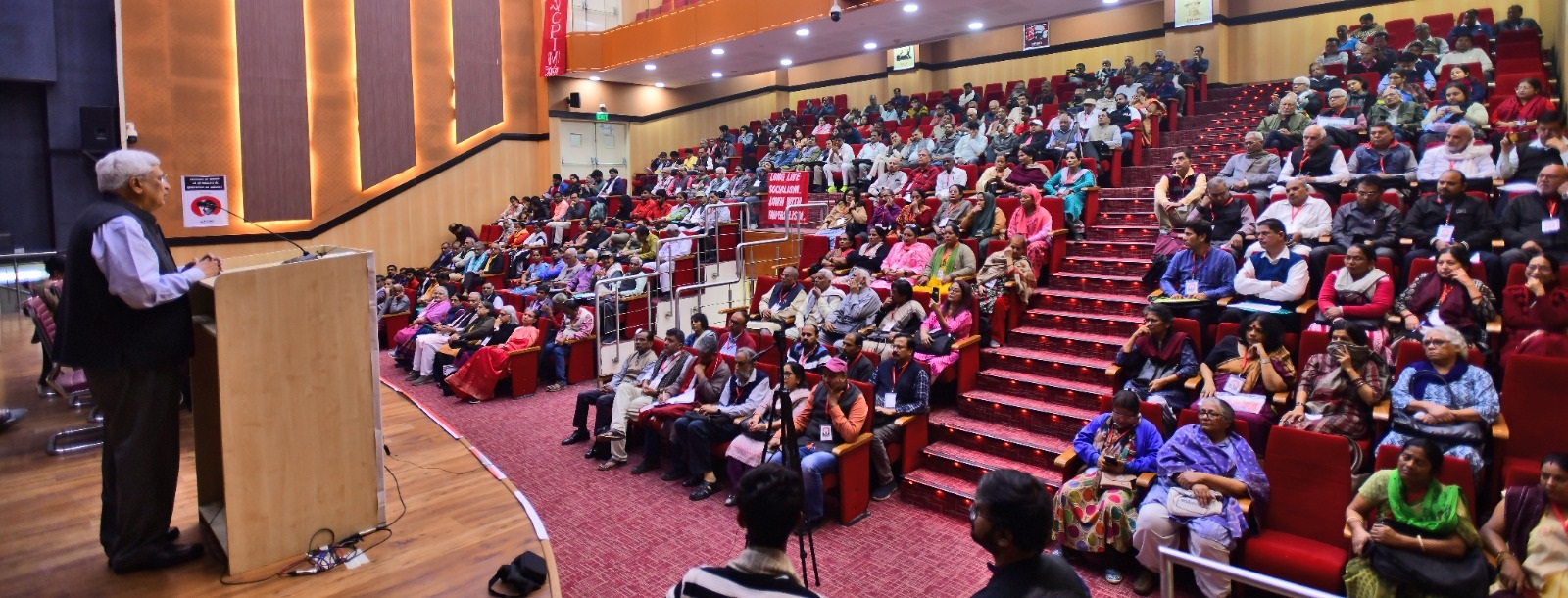
THE three day (November 22-24, 2024) Delhi state conference of the CPI(M) held at HKS Surjeet Bhavan started with the senior-most comrade Jagdish Chand Sharma unfurling the Party flag. The condolence resolution was moved by Brijesh Kumar Singh. The inaugural session was addressed by Prakash Karat, coordinator, Polit Bureau. He said the successful conduct of the Party conferences and Congress would be the best tribute to Comrade Sitaram Yecchury. Prakash said along with the draft political resolution, a review report of the political tactical line of the Party since the last Party Congress would also be circulated to Party units for wider discussions this time. He said it would be a mistake if we draw the conclusion that the RSS-BJP would mend their Hindutva-corporate agenda and authoritarian ways after losing their majority in Lok Sabha. Prakash said sections of the big bourgeoisie have adopted the Hindutva ideology appreciating the fact that it could be the best weapon against the working class. The Hindutva-corporate alliance considers imperialism as their natural ally.
Prakash Karat said the Party has to critically evaluate the growing Hindutva consciousness in northern and western part of the country. He said in spite of our exhortation to fight these forces on the ground we are yet to prove it. He said given the situation in which most of the opposition parties are not in a position to fight Hindutva ideologically, it is our task to mobilise people through class and mass organisations. Hence it is our task to arrive at a political, ideological and organisational line to consolidate the independent strength of the Party. Prakash also highlighted bourgeois tokenism seeping into our Party in struggles and sought to overcome it through building live contact with people and raising local issues. He said the RSS-BJP effort to integrate themselves into the imperialist camp and its anti-China tirades need to be combatted in the coming days.
K M Tiwari initiated the report presentation of the state committee with Rajeev Kunwar and Anurag Saxena explaining the other sections. The 140 page report critically reviewed the work of the Party and the mass organisations since the last conference. The conference adopted resolutions against attacks on democracy, communalism, neoliberal policies and National Education Policy. It also adopted resolutions on health services, women struggles, socio-economic conditions of dalits in Delhi and working class issues in Delhi NCR. The more than seven hour long discussion over the report had the participation of 71 delegates representing the district committee, local committee, organising committee, state committee and state fraction committees. The delegates demanded more clarity on Party’s stance towards AAP government, the need for larger cultural and political efforts to fight Hindutva, the need for organising linguistic minorities and class/social composition within the Party. They also raised the non-implementation of minimum wages in Delhi, the issues of women not getting amplified into struggles and student front’s demand for gender sensitisation, more integration with the Party at localities level. The youth front work not taken up seriously at the local level in spite of the Kolkata plenum guidelines and Party education to strengthen the political-ideological consciousness of the members to take on Hindutva were the other major discussion points raised by delegates. KM Tiwari replied to the discussions of the delegates.
Brinda Karat, in-charge from the Polit Bureau replied to certain issues in her concluding speech. She posed the question whether the state conference took note of the penetration of Hindutva- manuvadi ideology aggressively supported by the corporates among dalit sections and working classes at large in Delhi NCR. She said the reality of the supremacy of the RSS-BJP ideology among Delhiites which forces the bourgeois parties like the AAP and Congress to tail them and take a soft line towards it, needs to be addressed. Brinda added that being a multicultural city Delhi has the potential to fight Hindutva over the unity of linguistic sections along with its strong cultural presence and a working class base. With regard to certain misconceptions of state party being soft towards INDIA allies, she said the Party understands the limitations of INDIA bloc being limited to parliamentary sphere and the challenge is to strengthen the ideological fight against Hindutva simultaneously. She said whenever the Party has led class and social struggles keeping the live links with the people, it had won. She said Delhi had shown improvement in adopting the Kolkata plenum suggestion of adopting a mass line and she advised to turn campaigns into struggles. On queries over social composition in the Party, she said Party’s struggle was always against mechanically adopting class without addressing the social reality, as well as reducing identities into identity politics. Brinda also added that capitalist development is fast changing the social structure of India and it has always been our understanding that caste is used as an instrument to add surplus value. She also said despair is the result of absence of live contact with the people and its remedy lies in raising issue based struggles of the masses.
The conference elected Anurag Saxena as the state secretary. The 30-member state committee elected a nine-member state secretariat and a permanent invitee. The conference was attended by 42 women comrades out of a total of 157 delegates. Six new members have joined the state committee. The average age of the state committee members is now 54.


